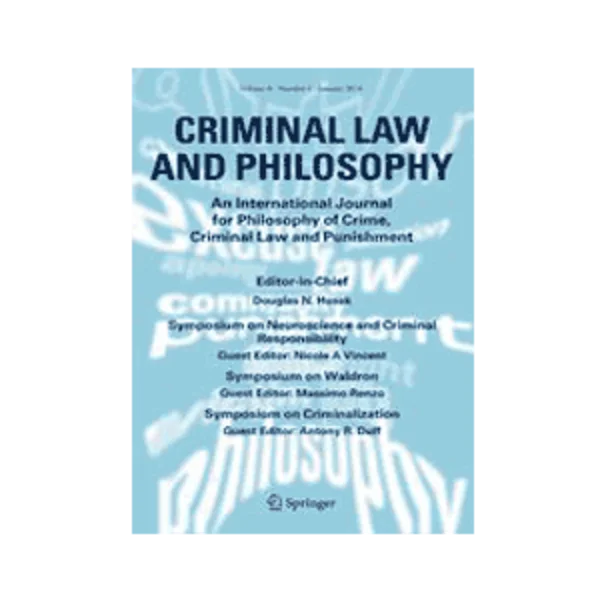-
criminal responsibility and the living self
جزئیات بیشتر مقاله- تاریخ ارائه: 1392/07/24
- تاریخ انتشار در تی پی بین: 1392/07/24
- تعداد بازدید: 1047
- تعداد پرسش و پاسخ ها: 0
- شماره تماس دبیرخانه رویداد: -
behaviour, including criminal behaviour, takes place in lived contexts of embodied action and experience. the way in which abstract models of selfhood efface the individual as a unique, living being is a central aspect of the ‘ethical-other’ debate; if an individual is modelled as abstracted from this ‘living’ context, that individual cannot be properly or meaningfully linked with his or her behaviour, and thus cannot justly be understood as responsible. the dominant rational choice models of criminal identity in legal theory involve at least a partial abstraction of this ‘unethical’ type by prioritising the rational will over the more fluid dimensions of lived reality. from a phenomenological perspective, an approach of ‘restlessness’ is proposed which precludes the development of settled or general abstract categories, and can thus move us closer to an ethical understanding of living individuals on a theoretical level. although such a move may initially seem to threaten criminal justice with an irrational nihilism, by maintaining awareness of the irreducibility of ‘living’ reality a restless theoretical understanding of moral selfhood may be able to shape or underpin the attribution of responsibility in more practical or substantive contexts without succumbing to meaninglessness.
مقالات جدیدترین رویدادها
-
استفاده از تحلیل اهمیت-عملکرد در ارائه الگوی مدیریت خلاقیت سازمانی و ارائه راهکار جهت بهبود
-
بررسی تاثیر ارزش وجوه نقد مازاد بر ساختار سرمایه شرکت های پذیرفته شده در بورس اوراق بهادار تهران
-
بررسی تأثیر سطح افشای ریسک بر قرارداد بدهی شرکت های پذیرفته شده در بورس اوراق بهادار تهران
-
بررسی تأثیر رتبه بندی اعتباری مبتنی بر مدل امتیاز بازار نوظهور بر نقد شوندگی سهام با تأکید بر خصوصی سازی شرکت ها
-
تأثیر آمیخته بازاریابی پوشاک ایرانی بر تصویر ذهنی مشتری پوشاک ایرانی (هاکوپیان)
-
نقش چشمه های آبگرم معدنی در رونق گردشگری با تاکید بر شهرستان مشکین شهر
-
مطالعه سیاست جنایی مشارکتی ایران در پیشگیری از قاچاق کالا و ارز
-
مطالعه تجربی تاثیرات نسبت های اختلاط و سن نمونه بر مشخصات مکانیکی بتن پلاستیک با استفاده از آزمایش سه محوری
-
مرتب سازی اسپایک های عصبی با استفاده از شبکه عصبی بدون استخراج ویژگی
-
بررسی گسترش خرافات و جادوگری در ایران با تاکید بر دوران صفویه و قاجاریه
مقالات جدیدترین ژورنال ها
-
مدیریت و بررسی افسردگی دانش آموزان دختر مقطع متوسطه دوم در دروان کرونا در شهرستان دزفول
-
مدیریت و بررسی خرد سیاسی در اندیشه ی فردوسی در ادب ایران
-
واکاوی و مدیریت توصیفی قلمدان(جاکلیدی)ضریح در موزه آستان قدس رضوی
-
بررسی تاثیر خلاقیت، دانش و انگیزه کارکنان بر پیشنهادات نوآورانه کارکنان ( مورد مطالعه: هتل های 3 و 4 ستاره استان کرمان)
-
بررسی تاثیر کیفیت سیستم های اطلاعاتی بر تصمیم گیری موفق در شرکتهای تولیدی استان اصفهان (مورد مطالعه: مدیران شرکتهای تولیدی استان اصفهان)
-
جرم شناسی جنوب
-
تنقیح مناط کتاب تاریخ تشیع در غرب اسلامی پس از شانزده سال، جامعه شناسی سیاسی دولت
-
تحلیل تفسیری مفهوم «صراط مستقیم» در سوره فاتحه با تمرکز بر تفسیر المیزان علامۀ طباطبایی رحمۀ الله علیه
-
environmental and economic analysis of selected pavement preservation treatments
-
preparation and characterization of tio2 fe2o3 nanocomposite by sol gel method




سوال خود را در مورد این مقاله مطرح نمایید :